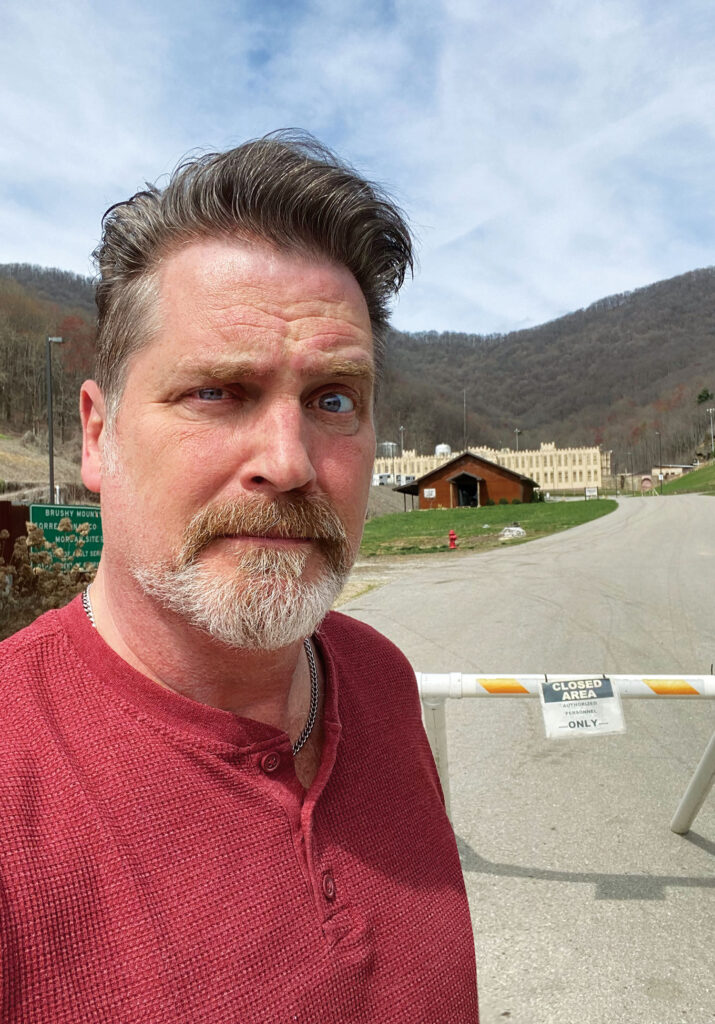Every prison movie I’ve ever seen haunts me like a long, dark shadow.* Scenes from those movies — as well as a few haunting scenes from my own life — were flooding my mind as I stood in the shadow of Brushy Mountain State Penitentiary in Petros on a recent spring day.
I was stunned to see it, this majestic Gothic building wrapped in the surrounding forest. The afternoon sunlight gives the building a strange warmth as it leans against the gray-brown foothills of the Cumberland Mountains. It was closed for the season on the day I was there. The tourist season doesn’t start until April, and I was a few weeks early.
That’s right, I said “tourist season.” Brushy Mountain is now a tourist destination with a brewery and restaurant on site. Travis Tritt is playing there in July. People will soon be coming from all over the world. It closed as a prison in 2009 and was repurposed in 2018 as a place to bring the family, have a burger, drink a beer and see some live music; all the while visitors are not so gently reminded of the dark solitude of incarceration.
The terrain is no accident. Indeed, officials in 1896 broke ground deliberately for the maximum-security complex here in these mountains, making escape inconvenient — if not outright impossible. The most famous escape attempt was made by James Earl Ray (killer of Dr. Martin Luther King Jr.) who tore off into the mountains with several other prisoners only to be caught a few days later in the surrounding maze of dense trees.
Brushy Mountain’s tour schedule for April and May is Thursday to Sunday, 10:30 a.m. to 7 p.m., the last tour starting at 5 p.m. The prison is open on Memorial Day. It is open daily through the peak season — June, July and August — and then slows to the Thursday-to-Sunday schedule again in September and October. Except for occasional private ghost tours conducted by independent guides, the prison is closed November through March.
I have my own reasons for being spooked here. If fate’s right hand had twisted only slightly in my life, I could have easily taken a turn toward penitentiary doors. I was clearly heading that way as a boy of 14 — angry, bored and looking for trouble.

The pivot foot, or what I learned from eighth grade basketball
I had a growth spurt in my 14th summer and was encouraged to try out for the junior high basketball team. I didn’t enjoy it. I left my uniform in the locker room one day and never went back.
But there’s one lesson from all those ball practices I think about to this day: the pivot foot. After you find yourself in possession of the ball, you can dribble and run, but once you’ve stopped, you’re not allowed to move again. One of your feet must be planted as if nailed to the floor. This is done to avoid a “traveling” penalty. You can turn 360 degrees from that foot while trying to pass the ball.
I got to use my pivot foot that same year in a much different way, and I remember right where I was.
I was sitting on a hard, wooden bench outside the judge’s chambers in the long, echoey hallway of juvenile court, or “juvy,” as it was lovingly called. I was next to my mom who sobbed openly while my stepfather rubbed his big, calloused hand along her back in a futile gesture of comfort. I can still hear his calloused fingers as they gently snagged the fabric of Mom’s blouse and the echo of hard-heeled lawyers clopping by us on the dark, hardwood floor.
I had been arrested for possession of various substances I will avoid mentioning here in the hopes of gaining some points for good taste, and because, well, it’s embarrassing now, it still stings and, thankfully, I’ve moved on.
The pivotal point for me didn’t come while I was standing in front of the stern, impatient judge who resembled Lurch from “The Addams Family.” No, I had already decided to turn over my new leaf moments earlier on the bench in the hallway. I put these good people here. They didn’t deserve this.
I was sentenced to three months of probation and assigned a kindly probation officer who came to my high school once a week to monitor my progress. I found new friends. I changed my ways. And I never had reason to sit on that bench again or go anywhere near that courthouse for any reason other than to update my car tags. On my last visit with the probation officer, the school vice principal, Mr. Sherman, came over in some manner of congratulations and told me words I’ve never forgotten: “You try so hard to be a bad kid, but you’re just not very good at it. This isn’t you.”
He was right. So I planted my foot and pivoted. I did a 180, dropped that particular ball and walked away. It was one of the best moves of my life.
But that experience left a lingering dread deep inside of me. I saw firsthand how easy it could be to end up behind bars, and, therefore, I now see every prison movie as a biopic; namely, mine — or at least something dwelling in the misty outer reaches of “The Could Have Been.”
I used to bring this up in conversation, but I don’t do that anymore. And I thought long and hard about bringing it up here because this is pretty vulnerable stuff. The last time I mentioned it publicly was a few years ago with a group of friends at a bar in Nashville, and it didn’t go well. There was a lull in the small talk, and loathing small talk as I do, I attempted to steer the conversation in what I thought would be a more meaningful direction.
“Show of hands,” I said eagerly. “Who else has the fear that you might end up in prison some day?”
I’ve only heard silence like that in a bar twice. The other time was when the bartender got a phone call and shouted, “Is there a Bob here?”
My acquaintances looked at me like I was insane, as did a few people from neighboring tables who heard me ask my question a little too loudly.
They collectively shook their heads, saying, “No,” and “God, no.” The thought that they might one day be handcuffed and led to a prison cell had never occurred to them. Not once. One guy even asked, “What’s wrong with you?”
What’s wrong with me? Well, I could fill up all 40 pages of this magazine trying to answer that question, but for the remainder of that night, I chimed in only with the dreaded, forgettable small talk about rush-hour traffic and keto diets. As I recall, I slipped out early and went home to a frozen pizza.
All these years later, I’m still certain I can’t be the only one who carries this fear. So I decided to ask around.
After weeks of questioning, it appears that I am, indeed, the only person I know who has a fear of being handcuffed and hauled away to prison.
So, I forgot about trying to get others to admit to it and decided to talk to my friends who’d actually been there, who spent some time on the inside. As a musician, I belong to a particular demographic closer in proximity to the more colorful citizens, decorated as they are by the dubious stripes of life. I have a number of rehabilitated, now-legit, law-abiding friends who once made a mistake, paid their dues and are now living their best lives. One of these friends — one of my best friends, actually — is my buddy Daren. I decided to reach out on the subject at hand and texted him.
“I’m thinking of doing one of those tours at Brushy Mountain State Pen. It’s like a tourist thing now. Restaurant. Brewery. Wanna join me? Meals and hotel rooms on me. I’m buying.”
Daren replied quickly, “I already toured it once. But yeah.”
“Oh. You’ve been there?”
“Yeah, I was there for three days when they transferred me to another prison.”
Daren robbed a bank. In his words, he was “19 and stupid.” He did 12 years. It was a long time ago.
“Oh. Wow. OK. Well,” I texted. “You mind going back? Giving me a tour? Or would that be too triggering?”
“Not at all,” he replied. “I don’t care. That sounds awesome. I can give you a tour you won’t get from the staff there.”
“OK,” I responded. “Tours start back up in April. I’ll give you a call and we can sort our calendars.”
Daren replied with a thumbs up.
I set my phone down and let my mind sweep gently over the chapters of my life that brought me where I am today.
Daren’s life runs a strong parallel to my own. Both of us were raised in trailer parks by single moms with stepfathers who came into the picture a little too late to ward off our imminent delinquency. Each of us found his pivot. Mine was found in juvy; Daren found his in prison. Recently, over burgers, fries and iced tea, we talked about our mistakes, expressing gratitude for what they taught us and where we were fortunate enough to go since.
I’ll be putting the tour together soon and scheduling our sojourn to Brushy Mountain. In the meantime, I’ll take in the newness of spring, the songbirds and green buds of another Tennessee in bloom.
Yesterday, I heard the sound of my calloused fingers brushing across the back of a favorite person, and it caught me off guard. Full circle stuff like that often does. A while ago, that sound might have triggered something dark and shameful. Today, I hear that sound and think of the people who helped me pivot. I like that.
*I have seen all the prison movies, but my favorite is “The Shawshank Redemption,” although I’ve never rented it or even watched it straight through. Not once. Like most Americans, I saw it in several installments on random Saturday afternoons in the early 2000s in between mowing the grass and watering the houseplants. For some reason, “The Shawshank Redemption” aired every Saturday on cable TV for years. Morgan Freeman’s lush, velvety baritone would stop me, mesmerized in front of the television with a dripping pitcher of water and rusty lawn shears in my lifeless hand. I stood trancelike until Tom Selleck’s life insurance commercial would once again break my concentration, freeing me to return to my chores. However, 20 minutes later, that godlike voice would lure me back in from sweeping grass off the back porch. Morgan’s glorious siren song would be delivering another melodic couplet about the mysterious Andy Dufresne. I was powerless to stop him.



